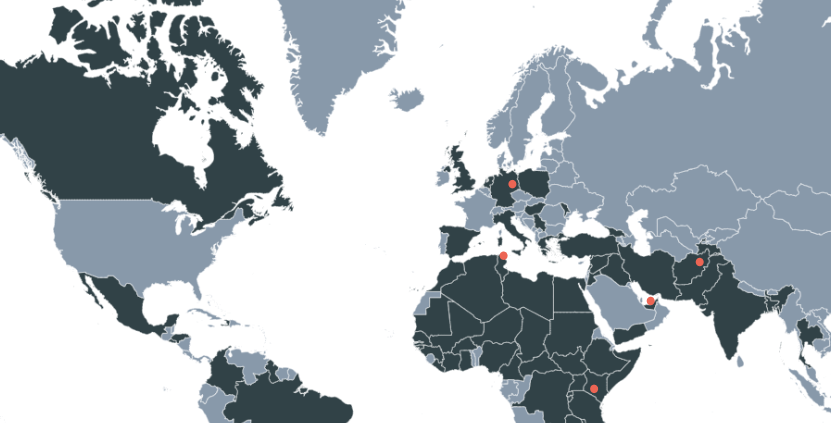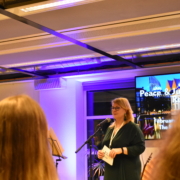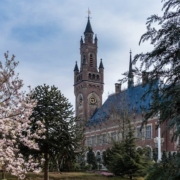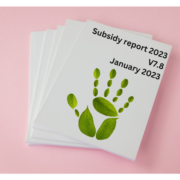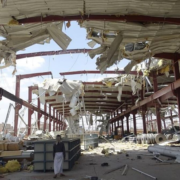SAMUEL HALL WORKS TO BRIDGE THE GAP BETWEEN RESEARCH AND POLICY, WHILST BUILDING LINKS WITH LOCAL RESEARCH PARTICIPANTS
By Hannah Terry
Operating from offices across Kabul, Nairobi, Tunis, The Hague and Berlin, Hub member Samuel Hall fosters a network of researchers that bridge the gap between communities and changemakers, using data and analysis to shape and influence policy and practice. The organisation, a social enterprise, specialises in research and policy, monitoring, evaluation and learning, as well as data analytics in the context of migration and displacement The team does not stop at the research – communications is an essential part of distilling and translating complex research findings to trigger action, exchanges, and partnerships.
Samuel Hall’s involvement spans funding research, training researchers from the Global South, and providing country of origin information that can support lawyers and justice systems globally. The work is locally rooted: the employment of local data collectors, refugee researchers, and team leaders, was able to continue during COVID-19, with the support of communities that are targeted for support. The research benefits communities and improves standards of data collection.
Samuel Hall’s team employs innovative and participatory techniques, fostering a non-extractive approach, rooted in ethical collaborative principles. Their involvement in the HABITABLE consortium showcases their dedication to engaging local communities in addressing climate change and migration. By valuing community feedback, they contribute to fostering effective research spaces.
Local Relevance
Samuel Hall’s staff – composed of full-time employees and consultants from across the globe – are rooted in regional contexts, working on global challenges, but cater to local needs. Even in multi-country endeavours, the organisation works to ensure that findings and recommendations remain relevant to each locale.
For instance, in collaboration with IOM and UNEP, Samuel Hall conducted a study examining the relationship between climate change, displacement, and urbanisation in Somalia’s Baidoa and Kismayo cities. Local data collectors played a vital role, identifying climate-induced migration triggers and proposing tailored solutions for resilience. Similarly, under the ACP-EU Migration Action, Samuel Hall partnered with IOM to empower Refugee Led Organisations (RLOs) in Kakuma and Civil Society Organisations (CSOs) in Kismayo on digital remittances and financial inclusion.
Community Participation
Notably, the organisation incorporates participatory methodologies like autoethnography, as seen in the Regional Development and Protection Programme (RDPP) evaluation funded by the Dutch Ministry of Foreign Affairs. By involving returnees as researchers to keep journals and their impressions over time, Samuel Hall bridges the gap between subjects and researchers, enriching the evaluation’s depth and success.
To ensure community participation beyond data collection, Samuel Hall seeks to engage with local communities through establishing partnerships with refugee-led organisations. They have initiated the Samuel Hall Fellows Program, maintaining connections with former colleagues and local researchers including refugees and other migrants with. Additionally, working with IIED on the Protracted Displacement in Urban World (PDUW) project, they have conducted participatory planning forums in various cities, including stakeholders from municipal governments, displaced communities, civil society, and more. These forums enable continuous validation, translating research findings into impactful solutions.
Samuel Hall’s approach, grounded in local engagement, underscores their role as a nexus between research and practice, and their commitment to evidence-based policies. Through innovative methodologies, community involvement, and tailor-made solutions, the organisation not only addresses pressing issues such as migration, displacement, and climate change but also embodies a commitment to research relevance and lasting impact in coordination with leading universities, including Erasmus University and the International Institute of Social Studies (ISS) based in the Hague, two of Samuel Hall’s many academic partners.
For more information about Samuel Hall’s work, check out their website.
(Photo via Samuel Hall website)

